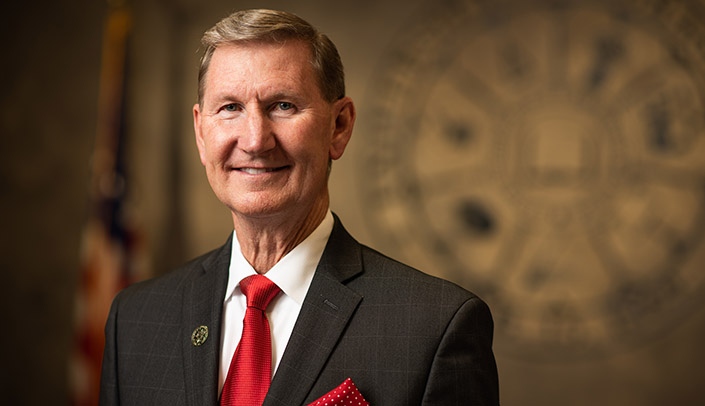The University of Nebraska has released a new special edition of its “Leading Nebraska” podcast series, featuring NU President Ted Carter’s journey from an admiral in the U.S. Navy to president of Nebraska’s public university system. The podcast covers Carter’s leadership philosophies, his first 11 months on the job, and his vision for continued growth and success across the university’s campuses even during challenging times.
Carter began as NU president on Jan. 1, following a tour of more than a dozen Nebraska communities that led him and his wife, Lynda, to believe Nebraska was, as they put it, “their next great calling” after his service as president of his alma mater, the U.S. Naval Academy.
Only a few months after Carter assumed the role of NU’s eighth president, COVID-19 and the economic crisis that came with it began to hit the United States.
Carter and the university’s chancellors quickly made a decision to respond with a bias for action, with the needs of NU’s 51,000-plus students, their families and all Nebraskans their North Star as they made their decisions.
That’s an approach Carter says he learned during his 38 years of military service.
“We operate in a world of unknowns. What I came to know: You’re never going to have perfect information to make the big decisions,” Carter says in the podcast. “The ‘fog of war’ is that imperfect information. If you’re waiting for the final last bit of information to make a decision, it might be too late.”
Carter launched the Nebraska Promise, an expanded financial aid program that provides free tuition for Nebraska students with family incomes of $60,000 or less. He implemented a two-year, across-the-board tuition increase and, in collaboration with the campuses, reduced and standardized tuition rates for online undergraduate programs.
Finally, he and the chancellors declared early in the spring that the campuses would re-open for in-person learning for fall 2020, providing what Carter calls “hope and predictability” for students and families.
The actions paid off with a 1 percent growth in enrollment this year at a time when the national narrative had projected steep declines. All of NU’s campuses saw growth among Nebraska students, and thanks in part to Nebraska Promise, there were key gains among minority, first-generation and other underrepresented students.
“When you add all that up – affordability, accessibility, setting programs that are for the students – I think that really resonated,” Carter says.
Carter’s priorities for the university system are captured in a five-year strategic plan that he released in August. The plan focuses on broad themes of affordability, access and attainment; workforce development; partnerships; diversity and inclusion; and efficiency and effectiveness.
He praised faculty across the campuses for their leadership in areas like water and agriculture, national security, infectious disease, early childhood education and rural vitality, noting they are continuing to achieve new successes even as they manage the immediate challenges that 2020 has brought.
Carter also thanked Nebraskans whose commitment to their university makes Nebraska stand out. The state, he says, has a competitive edge as it looks to the future.
“I’m a big fan of John Paul Jones, arguably the father of our Navy. My favorite quote from him is a simple one. It says, ‘Come sail with me,'” Carter says.
“It was a rallying cry to recruit people, and I feel like we’re in a space like that right now here in Nebraska. ‘Come to Nebraska. Come learn with me.'”
